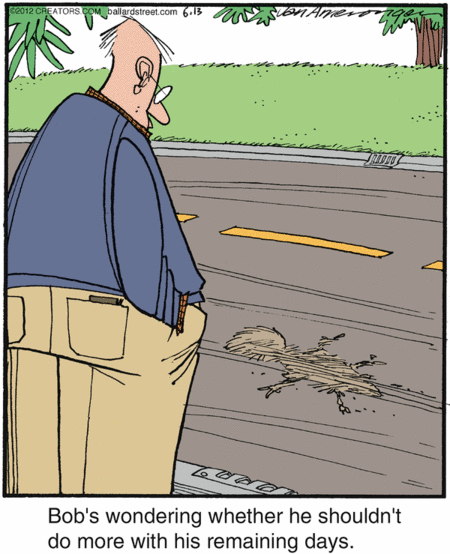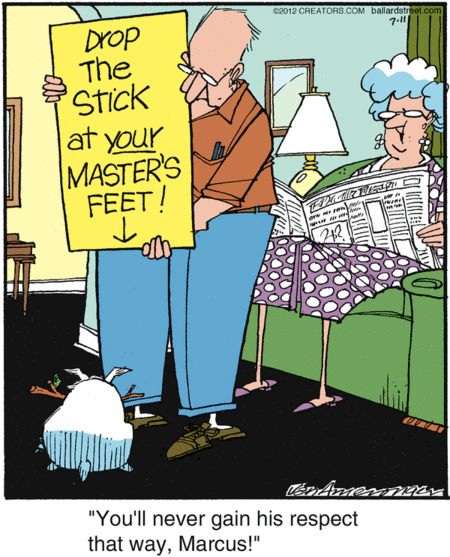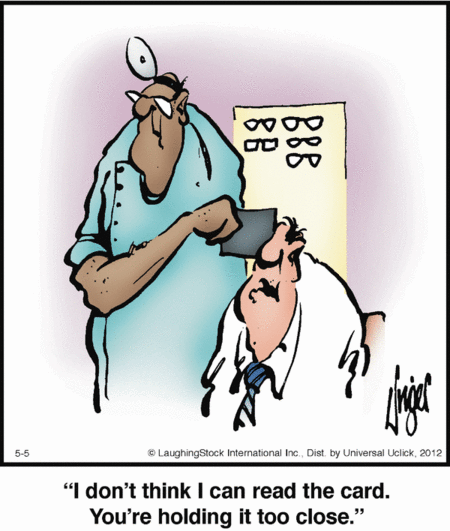Podcast: Play in new window | Download ()
Subscribe: Apple Podcasts | Spotify | | More
Podcast: Download | Non-Flash Playback
 Look over at that cartoon by the great Jerry Van Amerongen. That’s me starting at that road kill squirrel.
Look over at that cartoon by the great Jerry Van Amerongen. That’s me starting at that road kill squirrel.
Well, that was me, back around the beginning of 2009 (probably much sooner, actually). I had been in the same industry, doing the same kind of work for going on 37 years. Professionally, I was as dissatisfied as I had ever been, but I was still energetic and ambition. In a few months I would turn 52.
It was time for an encore career.
It was time for what Marc Freeman, the founder of Encore.org calls “the big shift.”
I’d been pondering such things for a long time. I can’t be sure for how long.
By the time Spring rolled around in 2009 it was time.
For the BIG SHIFT.
With one successful career behind me it was daunting to chase success in a new one. It was especially difficult because the new one was undefined. Oh, I had some ideas. And I tried some things. But nothing worked.
Age, maturity and experience have benefits, but they also have a downside.
On one hand I was grounded and stable. I wasn’t one paycheck away from homeless. I was debt free, but I was far from financial independence. That is, I couldn’t just sit back and enjoy my money – because statically, I knew my wife and I would outlive our money. Besides, I wasn’t ready to sit back and enjoy leisure. I don’t think I’ll ever be ready for that. It’s not how I’m wired.
On the other hand, age makes adjusting difficult. And I’m prone to change. Given to embrace it. But there is something to the realization that you have more past than future. That restricts your choices. Practically speaking, older folks tend to approach life in a more reasonable, perhaps less ambitious fashion. Not me.
For me the downside of age, experience and maturity was how I defined myself professionally. When you’ve spent the better part of 4 decades doing something (the same thing) and being something – you tend to feel defined by it. Deep down you realize that your “job” isn’t who you are, but it sure feels that way.
The identity decompression took much longer than I planned. It lasted from the Spring of 2009 through the end of 2011. That’s right. Two and a half years passed with me trying to figure things out. Along the way I was podcasting, but I was working…doing work I really didn’t want to do. Feeling as though I had jumped out of the frying pan into the fire.
2011 ended and more shifting happened.
And now, I have more clarity. I’m sure things will continue to morph, but as the Encore.org tagline says, “Encore careers combine purpose, passion and a paycheck.”
I have starred at the road kill and pondered the very thing Bob is wondering. I’ve been driven by the practical realities of the paycheck. Yes, I’ve sold out my fair share and done things that didn’t fulfill me because the money attached was high enough.
Today, more than ever before in my life, I understand how Michael Jordan felt riding on a minor league bus failing at a new game. Just because you made it in one career doesn’t mean you’ll make it another. It can be very tough work to figure out what you’ll do for an encore.
Life is a story. It’s being written daily by our choices and actions. But first, it starts in our head – wondering whether we shouldn’t do more with our remaining days. Some of us have fewer remaining days than others. We have to get busy.
Thank you for listening. I’ll do better by you in the future!

P.S. Maybe it’s fitting that today’s show lacks production elements due to one of the PreSonus FireStudio Project firewire interfaces failing. Lord willing, I’ll send it off, have it repaired and all will be back to normal Inside The Yellow Studio. Well, as normal as things ever are around here.




 Look over at that cartoon by the great
Look over at that cartoon by the great